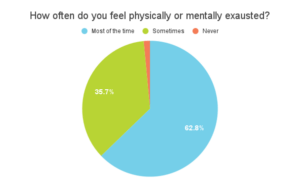Atlanta, GA, hosted the Georgia Nurses Association’s first conference in years at the beginning of the month. Not only are they calling on leaders to change healthcare in Georgia but they are challenging nurses to be the catalysts and leaders of that change.
The Avalon Hotel was the setting for the long-awaited GNA conference, and it was evident that the attendees were excited to see each other and ready to learn. The agenda was designed to allow participants to learn and engage in discussions regarding a diverse set of topics and to leave the event ready to take actions that will drive healthcare to change. The conference kicked off with a session led by GNA President, Dina Hewitt, and Matchwell’s own Director of Clinical and Quality, Bree Becker, about the “Nursing Workforce: Now and in the Future”. While all the presentations and breakout sessions were phenomenal, Dina and Bree’s presentation informed and challenged me the most.
Addressing the issues.
Bree, who has been a nurse for over 15 years, started the session by sharing an excerpt from Isabel Wilkerson’s book, “Caste: The Origins of Our Discontents.” She read the following passage:
“Few problems have ever been solved by ignoring them.”
We know that there has been an exodus of healthcare workers, so our job is to dig in and identify the underlying causes instead of hoping it will fix itself or continuing to repeat the same “solutions” expecting a different outcome. She referenced a survey completed by Matchwell. Their data shows that when we listen to the workforce, we hear that almost 63% are telling us that they are exhausted. And it’s not just the frontline workforce, our leaders are feeling it, too. We’ve spent a lot of time over the last couple of decades talking about burnout, but we’re now at a tipping point and we’ve got to develop actionable plans to address it. And it’s more than self-care and pizza parties. Now is the time to evaluate what your organization is doing to address mental health support and overall wellness. Are they effective? Are they being utilized?

Focusing on wellbeing.
According to a 2022 Gallup survey, fewer than one in four US employees feel strongly that their organization cares about their well-being — the lowest percentage in nearly a decade. In addition to mental health support, we have an opportunity to foster a culture of well-being. In order to create that culture, we need to erase stoicism and create workplaces where our teams can thrive. Dina shared poignantly that there are times when it is appropriate to provide spiritual support for the nursing teams when they’ve encountered difficult patient situations. Just the fact that leaders would create that space for their teams shows their workforce that they are supported. Other examples are taking phones from charge nurses when they go on breaks so that they truly do ‘get a break’. These are not always easy things to do – they take planning and deliberate actions but create the environment that we want and are vital for our team’s success.
Needing more.
According to Staffing Industry Analysts, 24% of U.S. hospitals are reporting ‘critical’ staffing shortages. We’re losing our tenured healthcare workforce, and unfortunately, we don’t have enough incoming to replace them. In 2020 alone, 91,938 qualified applicants were denied admission to nursing programs because of faculty or preceptor shortages. When we seek to understand why we don’t have more healthcare professionals interested, we see that currently, clinicians are being paid 33% less to work in an educator role than in a hospital. And, like the rest of the healthcare profession, the current faculty and preceptors are aging out. One way we can drive change in healthcare is to let our voices be heard in schools and universities about the value of nursing educators and the impact they have on our fragile healthcare system, as a whole. Also, if you have not considered precepting, now would be a great time to use your skills and abilities to advance the future healthcare workforce.
Flexing our expectations.
One of the resounding themes we hear from clinicians is their desire for flexibility — in fact, the majority of employees think of flexibility as table stakes (the minimum offering). It is naive to think the healthcare workforce is an exception. I don’t know if this resonates with you, but as a nurse and Gen Xer mom of 3 Gen Z adults, I’ve had the opportunity to examine and reframe my own thinking. And, as difficult as it is to look at things through a different lens, it’s obviously necessary. The newer generations’ thought processes and interests are being shaped by numerous advancements over the last 20-30 years. Think about technology alone, and look at what has become possible with apps like Uber and Airbnb. The gig economy is all around us, so the increased interest in travel nursing shouldn’t surprise us. With that as our context, how is your organization meeting the unique needs of the multigenerational workforce? Is flexibility “easy to accommodate” at your organization or is it a struggle?
Hope on the horizon.
As we know, there are “opportunities” to improve healthcare, but I want to share a word of encouragement. The majority of clinicians who are choosing to stay do so because they have a calling, or sense of purpose, which is what keeps them coming back week after week. I don’t know how you feel, but I find that energizing — we can work with that! Now, it’s our job to take action and look for ways to support them so they stay, because even purpose has an expiration date.
Where do you start? Look at the areas highlighted here and assess your organization’s current response and ask a few critical questions.
Are there mental health resources and are they being utilized?
Is there an opportunity to advocate for higher pay within the local institutes of higher learning?
How about flexibility — are you meeting their needs?
Do you have the right people, frontline nurses, at the table for the conversations?
While I learned so much at the GNA conference, it reminded me about how incredible it is to be in healthcare. Thank you to all the front-line clinicians and leaders who continue to show up every day and who are looking for ways to advance the nursing profession. Let us know what you are doing to contribute and/or invest in the future of healthcare.

